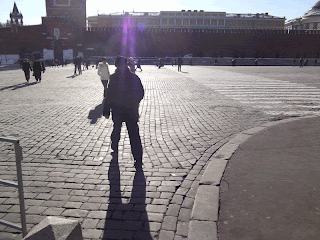The most common complaint about Moscow from my English and American visitors is that people here are incredibly rude in public, that they ignore you, and would walk into you if you didn't get out of the way. It's true that most people walk about fast and take no notice of others - they seem to set a direction and then just take it with no variation. This can include determined pushing in; particularly when crowds and queues are dense, for example, getting on the train or jostling to move onto an escalator.
I have been trying to make some sense of this - and its general juxtaposition in the tourist/travel literature with that 'other side' to the supposed enigma of the Russian soul; that indoors, in private, Russians are completely different, very nice people indeed, warm and welcoming (especially when they have got to know you).
Which leads me to suggest another way of looking at public walking, which might make English visitors feel a little less outraged. I am talking about body language - or more importantly - body
space. It is without a doubt that most English-speaking people are much more friendly in public, taking notice, talking and generally acknowledging each other. But, I suggest that these are the ways we are always subconsciously negotiating something else - a
certain distance between each other. So, we move out of the way, or allow the other person to move. The truth is, we don't like too close to or touched, however accidently, by strangers.
My colleague L and I seemed to reach a similar conclusion about public behaviour here at about the same time, and for the same reason. I was walking with some Russian friends in the snow and someone I didn't know at all calmly took my arm in case I slipped. She was attempting to traverse an impossibly busy road and another man planning the same thing took her hand so they could cross together. We were both shocked by being touched by strangers, even though they were just helping. Yet such small gestures of public solidarity actually abound here. They just don't come with chat or acknowledgement. I have seen metro seats given up for older people on countless occasions - it is just that no one says anything or looks at each other during the process (which from an English point of view feels pretty weird).
Our conclusion then, was this. Moscow people are not being rude in public - certainly not consciously - they are just not policing the space around themselves with the same zeal we do. Both the need to maintain a protected personal body space seems less important, and the size of the zone itself definitely smaller. (My students tend to sit not just together but much closer, what to my eye seems like literally on top of each other). So they just walk a lot closer when they pass.
My handy hint for Moscow visitors is as follows. Attempt to feel less defensive about your own personal body space being invaded. And just set a direction and take a determined - unconcerned - walk with the rest of us.
Of course, I want to hear from any Russians who might well say the above just shows my complete misunderstanding of the unwritten Moscow rules of public behaviour .....


























